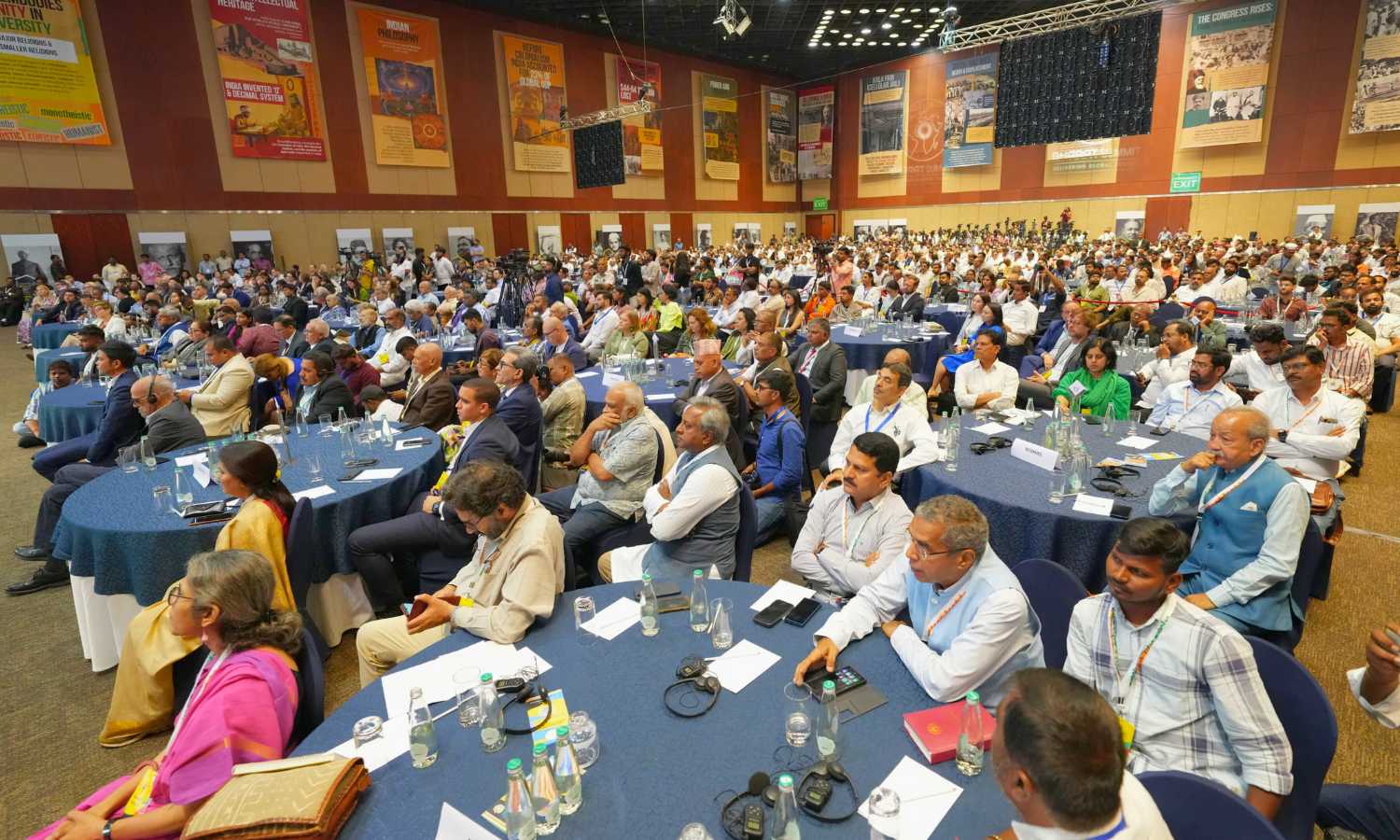Hyderabad: Chief Minister A Revanth Reddy on Saturday outlined a comprehensive and transformative roadmap for Telangana’s development during the Plenary Session of the Bharat Summit, pledging to deliver economic growth, social justice, and infrastructural modernisation under the Congress-led People’s Government.
In his address, Revanth Reddy said the new administration was committed to fulfilling the aspirations of Telangana’s people, launching wide-ranging welfare programmes and development initiatives aimed at building an inclusive and progressive future for the state.
He recalled Telangana’s long struggle for separate statehood, emphasising the sacrifices made by students, farmers, trade unions, and women. However, he noted that the aspirations of the movement had remained largely unfulfilled over the past decade. He stated that the Congress government, with its recent electoral mandate, was determined to realise those objectives by delivering holistic development across all sectors.
The Chief Minister highlighted the major welfare initiatives introduced since the formation of the People’s Government. He said that ₹20,617 crore worth of farm loans for 25.5 lakh farmers were waived on 15 August 2024, freeing farmers from mounting debt burdens. The government is providing 24-hour free electricity to farmers, an annual input subsidy of ₹12,000 per acre under the Rythu Bharosa scheme, and ₹12,000 annual support for landless farm labourers. In addition to the Minimum Support Price (MSP), farmers cultivating fine paddy varieties are receiving a bonus of ₹500 per quintal, along with benefits under Rythu Bhima and crop insurance schemes.

Revanth Reddy announced that the government had established the Young India Skills University to enhance youth employability and created 60,000 government jobs within its first year. Through the Rajiv Yuva Vikasam Yojana, financial assistance is being extended to five lakh youth across the state.
Paying tribute to the Congress party’s legacy, he cited the contributions of Jawaharlal Nehru, Indira Gandhi, Rajiv Gandhi, PV Narasimha Rao, and Dr Manmohan Singh in driving irrigation development, poverty eradication, technological modernisation, and economic liberalisation. He credited these efforts with positioning India among the world’s largest economies.
Revanth Reddy said Telangana’s investment drive had gained significant momentum, with official delegations participating in conferences in Davos, America, South Korea, Japan, and Singapore, resulting in investment commitments exceeding ₹2.5 lakh crore to generate employment in the private sector.
Highlighting women’s empowerment as a key priority, he said that self-help groups comprising 67 lakh women were being supported with the goal of creating one crore women millionaires. Women’s groups are leading initiatives in solar power generation, operation of RTC buses, and establishment of petrol stations. State power distribution companies have entered agreements to purchase 1,000 MW of solar energy produced by women-led enterprises. He added that 600 buses operated by women’s groups are now competing directly with corporate transport companies.
Under the Indiramma Housing Scheme, Revanth Reddy announced that ₹22,000 crore would be spent in the first year to construct houses for 4.5 lakh families, with women designated as homeowners. He also highlighted the successful rollout of free RTC bus travel for women, subsidised cooking gas at ₹500, free fine rice distribution through ration shops, and the provision of 200 units of free electricity.

In the healthcare sector, he said the government had strengthened the Rajiv Arogyasri scheme, offering free treatment up to ₹10 lakh for the poor, and disbursed ₹1,000 crore through the Chief Minister’s Relief Fund (CMRF) in the current year.
Revanth Reddy outlined environmental initiatives aimed at revitalising the Musi River, drawing inspiration from river restoration projects such as the Hudson River in New York, the Thames in London, and the Sumida in Tokyo. He said the Musi rejuvenation project would not only transform the river into a major tourist destination but also create thousands of employment opportunities.
Discussing infrastructure development, he said the government was building a Future City across 30,000 acres, constructing a 370-km-long Regional Ring Road, and expanding the Hyderabad Metro Rail network, with the objective of positioning Hyderabad as a globally competitive city.
The Chief Minister reaffirmed the government’s commitment to increasing revenue generation and redistributing wealth to marginalised communities. He said the administration was working proactively to introduce reforms, including a forthcoming welfare policy for gig and app-based workers.
He also mentioned that the Praja Vani programme had been launched to systematically address citizens’ grievances. Telangana, he said, had become the first state in India to conduct a caste survey and introduce Scheduled Caste categorisation, in addition to recruiting third-gender individuals into the state’s traffic police department.
Revanth Reddy invited delegates to collaborate with the state government by sharing their experiences, expertise, and innovations. He urged them to become brand ambassadors for “Telangana Rising” and to help showcase the state’s achievements to the world.
Hon’ble Chief Minister Sri A Revanth Reddy participates in Bharat Summit-Plenary Session at HICC, Hyderabad.https://t.co/dSbZHuwuuS
— Telangana CMO (@TelanganaCMO) April 26, 2025

